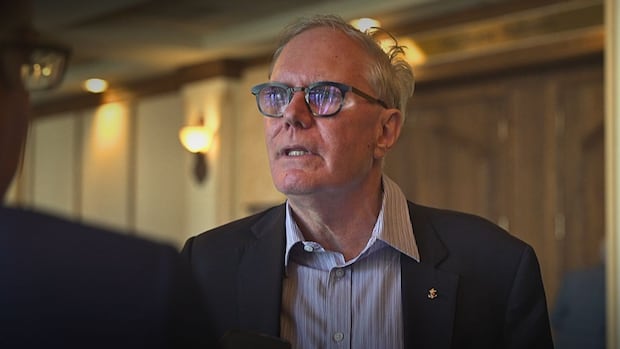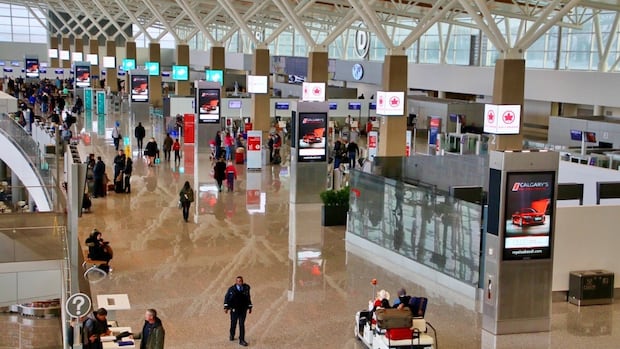Major airlines and airports, as well as both domestic and international travellers, could face added costs if pre-clearance services are lost in Canada, says an aviation expert.
Pete Hoekstra, the U.S. ambassador to Canada, said on Thursday that pre-clearance locations in Canadian airports are seeing declining numbers, as travel to the U.S. out of Canada slumps this year. The ambassador floated the idea that the U.S. may need to reassess offering the service.
“We’re not sure we can make the numbers work anymore … pre-clearance is something that is done at the expense of the U.S. government. We paid for it,” Hoekstra said at the Global Business Forum in Banff, Alta.
“You know, [if] you can’t make the numbers work anymore — you’re all business people. You know what that means. You’ve got to take a look at some of these things.”
WATCH | Former diplomat pushes back on remarks about pre-clearance in Canadian airports: 
‘Like a threat’: former diplomat reacts to U.S. ambassador’s pre-clearance comments
U.S. Ambassador Pete Hoekstra told a crowd at the Global Business Forum in Banff that as pre-clearance locations across the country experience declining numbers, Washington could reassess the program.
Pre-clearance allows travellers to clear U.S. customs in Canada before boarding, so they can avoid waiting in longer lineups at busier airports south of the border.
The first airport to offer pre-clearance into the U.S. was in Toronto in 1952. It was initiated in the first place to make U.S. travel more attractive to Canadians, said John Gradek, an aviation management professor with McGill University.
The service is now offered at airports in Calgary, Edmonton, Toronto, Vancouver, Montreal, Halifax, Winnipeg and Ottawa.
U.S. Customs and Border Protection operates 15 pre-clearance locations across six countries: Canada, Ireland, the United Arab Emirates, Bermuda, the Bahamas and Aruba. The department says it pre-cleared more than 22 million travellers in 2024, representing nearly 16 per cent of all commercial air passengers travelling to the country.
Declining U.S. travel
Both Air Canada and WestJet have significantly promoted flights into the U.S. from Canada, Gradek said, because of the ease pre-clearance provides. The airlines also promote this benefit to American travellers, who can use pre-clearance to pass through customs more efficiently when returning home from international destinations like London or Tokyo.
“[Pre-clearance] for passengers arriving in congested airports in congested time frames is a winner,” said Gradek. “So WestJet was getting a significant volume of traffic out of California [for example], connecting in Calgary to their international services.”
Gradek added the same could be said for Air Canada’s flights to the U.S. from Toronto, Vancouver or Montreal, and that Hoekstra’s comments present a lot of risk to airlines looking to attract U.S. traffic. Even though the popularity of U.S. travel has decreased in Canada this year, Gradek said the major domestic airlines still see a lot of trips booked into the U.S.
U.S. Ambassador to Canada Pete Hoekstra addresses the Global Business Forum in Banff, Alta., on Thursday. (Jeff McIntosh/The Canadian Press)
On Friday, WestJet spokesperson Jen Booth said the U.S. remains a significant market for the airline.
“As Canada continues to be the largest source of travellers to the United States, pre-clearance continues to be advantageous and an important element for the facilitation of cross-border travellers for both Canada and the United States, by significantly reducing congestion at points of entry in the U.S.A.,” Booth said via email.
U.S. expenses to run pre-clearance
Pre-clearance may take up substantial space in Canadian airports, but it’s the U.S. that primarily bears the cost of it through paying to staff the service.
Gradek said while it’s difficult to say with certainty exactly how much the U.S. economy financially gains from pre-clearance, it’s not hard to see the overall benefit to tourism.
“In principle, there is value, ad it doesn’t take much to figure out what that value is,” said Gradek. “People are making trips to Vegas or L.A. or New York, and doing those trips because of the convenience of pre-clearance.”
The finances of busy airports in Toronto, Vancouver and Montreal that see more U.S. flights will be hit harder if pre-clearance is lost, Gradek said. But he noted smaller airports in cities like Edmonton, Halifax and Winnipeg will still feel a significant impact if such a decision leads to more people forgoing U.S. travel.
While valuable real estate in Canadian airports would be opened up for other uses if pre-clearance is removed, the airports will at the same time likely lose revenue from a decline in U.S. travel.

